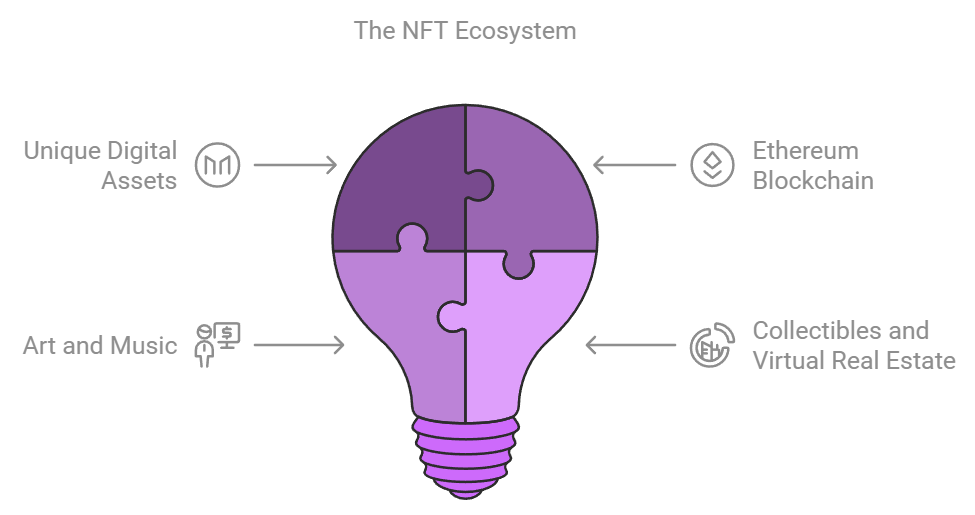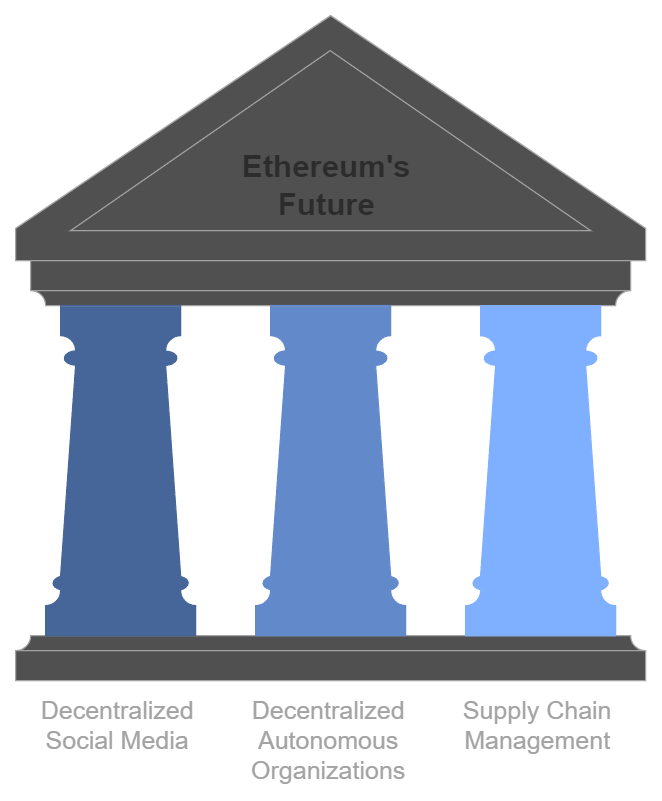Ethereum: Where Decentralization Started with it’s Innovative Smart Contracts!
The internet, obviously has changed in the past two decades. Once a place for static web pages, it has evolved into a dynamic, interactive, and data-driven world. But with that evolution came centralization. A few tech giants now control vast portions of the web. This where Ethereum with its decentralized (Web3) stepped in.
Enter Ethereum.
Back in 2015, something big went down—Ethereum launched. At first glance, it seemed like just another cryptocurrency hopping on Bitcoin’s bandwagon. But nah, Ethereum wasn’t here to play second fiddle. It wasn’t just some digital coin you’d trade and forget. Nope. It was the start of a whole new way to do the internet. Mind-blowing, right?
Here’s a wild detail: Ethereum kicked things off with GPU mining, kinda like Bitcoin. But they had a trick up their sleeve—it was ASIC-resistant. Fancy term, I know. What it really means? Anyone with a regular ol’ computer or laptop could mine. You didn’t need those pricey machines that only hardcore miners could afford. Smart move. More people got involved, started mining, and slowly realized: Ethereum wasn’t just about money. It was way bigger than that. Like, game-changing big.
Alright, let’s unpack this thing. What is Ethereum? Stick with me.

What’s Ethereum, Anyway?
Picture this: a global, digital notebook. Everyone can read it, but no one owns it. Sounds cool, yeah? That’s blockchain in a nutshell. Ethereum takes this concept and amps it up. Unlike Bitcoin, which is basically just digital cash, Ethereum’s a full-blown playground for developers. You can build apps on it—apps that don’t crash, don’t lie, and definitely don’t need someone babysitting them.
That’s the magic of Ethereum. Developers can create stuff called smart contracts and dApps (decentralized apps, if you wanna get technical). These babies run on their own—no middleman, no downtime, no sneaky interference. Honestly, kinda feels like sci-fi when you think about it.

Why Does That Even Matter?
Alright, think about your favorite apps—social media, banking, whatever. Who’s really in charge? Some big company, right? They’ve got your data, your experience, your life (okay, dramatic, but you get it). And if they wanted to shut you out? They totally could.
Ethereum’s like, “Nope, not today.” Instead of one company running the show, it’s spread across a global network. It’s decentralized. No single point of control. And lemme tell you—that makes things waaaay more open, transparent, and secure. Also? Harder to mess with.
Smart Contracts: The Secret Sauce
Now, this part’s seriously cool. Smart contracts. Ever heard of ‘em? Think of them as little chunks of code that handle agreements automatically. No lawyers. No trust issues. Just cold, hard logic.
Let’s say you’re renting an apartment. Normally, you’d sign a lease, pay the landlord, and hope they actually hand over the keys. Trust is a big deal here—what if something goes sideways?
With a smart contract, forget the “what if.” You send the payment to the contract. The contract checks everything, says, “Payment received,” and—boom!—you get the digital keys. No fuss, no stress. It’s all automatic. And trust? Doesn’t even matter anymore.
How do they work?
Imagine you’re renting an apartment. In the real world, you’d sign a rent agreement, pay your rent, and landlord accepts the deal. There’s trust involved trust that the landlord will give you the keys, and trust that you’ll pay on time.
With a smart contract, all of this is automated. The contract might say: “If rent is paid, the digital key to the apartment will be released.” Once both sides fulfill their obligations, the contract executes automatically. No middleman is needed.
Benefits of smart contracts:
- Trustless transactions: You don’t need to trust the other party; the code handles everything.
- Efficiency: The process is faster because everything is automated.
- Security: The contract is safe, running on Ethereum’s decentralized blockchain.

Ethereum vs. Bitcoin: What’s the Difference?
At first glance, it might seem like Ethereum and Bitcoin are similar. Both are built on blockchain technology, and both have a native cryptocurrency (Ether for Ethereum, Bitcoin for Bitcoin). However, their purposes are quite different.
- Bitcoin: Designed as a digital currency, a store of value, and an alternative to traditional money. Its primary goal is to be a decentralized alternative to banks.
- Ethereum: Focuses on being a platform for decentralized applications. While Ether (ETH) is used as a currency within the Ethereum network, Ethereum’s true potential lies in its ability to run applications and smart contracts.
Ethereum is often called the “world computer” because it allows for complex applications to run on a global, decentralized network.

The Birth of Decentralized Finance (DeFi)
One of the most exciting innovations to emerge from Ethereum is DeFi, (Decentralized Finance). In real world finance, we rely on banks, brokers, and other mediators to facilitate transactions and loans and you cannot even cash out the money you own talking about the big amounts. But DeFi has changed that.
DeFi is an entire financial system built on Ethereum, where users can:
- Borrow and lend cryptocurrencies without needing a bank everything is automated and coded.
- Trade assets on decentralized exchanges without middlemen.
- Earn interest by providing liquidity to various DeFi platforms.
All of this is done using smart contracts, transactions are automated and secure. Since there’s no central authority, anyone with an internet connection can participate, no matter where they live. you can code a smart contract and input whatever you can imagine. I have coded a simple smart contract when my child turns 18 at that date, ETH will be transferred from my account to his. if you want to learn this kind of simple contract comment below.

Ethereum’s Challenges
Despite its groundbreaking potential, Ethereum is not without challenges. As more and more users and applications join the network, Ethereum has faced issues related to scalability. High demand often leads to network congestion and high transaction fees.
The good news? The Ethereum team has already found solution.
Ethereum 2.0
The most anticipated upgrade to Ethereum is Ethereum 2.0. This upgrade will transition Ethereum from a Proof of Work (PoW) to a Proof of Stake (PoS) consensus mechanism. In simple terms, this change will:
- Make the network more energy-efficient (no more massive computing power required to mine Ether).
- Increase scalability, allowing the network to handle more transactions at once.
- Improve security.
Ethereum 2.0 aims to create a faster, cheaper, and more sustainable platform for decentralized applications.
NFTs: The Ethereum-Powered Digital Revolution
Another trend that has taken the world by storm, thanks to Ethereum, is NFTs (Non-Fungible Tokens). These are unique digital assets, verified on the Ethereum blockchain, that can represent anything from artwork to music, collectibles, and even virtual real estate.
What makes NFTs special is that they are one-of-a-kind. Unlike Bitcoin or Ether, which are fungible (one Bitcoin is the same as another Bitcoin), NFTs are unique and cannot be replicated. This has opened up new possibilities for creators and artists to monetize their work in the digital space.
From digital art auctions to virtual gaming assets, NFTs are being adopted across various industries, and Ethereum is the backbone powering this digital revolution.

The Future of Ethereum
As Ethereum continues to grow, its impact on the digital world will only expand. In the future, we may see a web where decentralized applications are the norm, and users have more control over their data, privacy, and online interactions.
Some predictions for Ethereum’s future include:
- Decentralized Social Media: Platforms where users own their data, and censorship is no longer possible.
- Decentralized Autonomous Organizations (DAOs): Organizations that run without traditional management, governed entirely by smart contracts.
- Supply Chain Management: Transparent, tamper-proof tracking of goods, ensuring authenticity and reducing fraud.

Conclusion
Honestly, I think Ethereum’s not just shaking up how we handle money—it’s flipping the whole tech world upside down. Imagine apps that actually work for us, not some giant corporation. Imagine power in our hands, where transparency isn’t just a buzzword.
I’ve gotta say, it’s kinda thrilling to think about. A future where fairness is built right into the system? Where we don’t need to “just trust” someone? That’s a world I want to be part of.
What about you?
more about Ethereum



